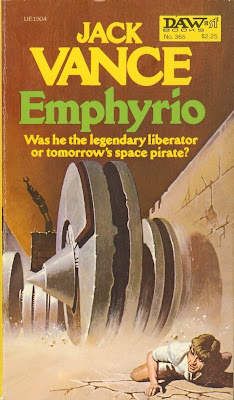 4 / 5 Stars
4 / 5 Stars‘Emphyrio’ first was published in hardcover by Doubleday in 1969. A mass-market paperback edition (208 pp.) was issued as DAW book No. 365 in 1979. It features a striking cover illustration by Gino D’Achille.
I decided to pick it up 'Emphyrio' in the used bookstore after seeing it listed as a ‘overlooked classic’ in a list of such novels by Scott Cupp at the SF Site.
On the planet of Halma, in the city of Ambroy, a small cohort of idle aristocrats, the Lords, rule over the majority lumpen proletariat. Technology is deliberately kept at a primitive stage; artists and craftsmen may not duplicate their work using any kind of manufacturing process. All laborers are required to pay 1.18 per cent of their income to the Lords, who dwell apart from the populace in ornate towers (‘eyries’), and enjoy access to space travel to other planets in the federation. Anyone who deviates from the social order risks accusation of ‘irregulationary’ behavior, and punishment, through a sort of mind-wipe process, is quickly imposed by the authorities.
Ghyl Tarvok is the son of a wood carver named Amiante. As he comes of age in Ambroy, Ghyl becomes more aware of the unequal distribution of wealth in his society, its strictures on advancement, and the legends of a rebel named Emphyrio, who in the distant past acted against the overlords and was executed for his efforts to bring change to Halma.
When Ghyl reaches adulthood, he contrives to leave Halma, embarks on a life as a space pirate and searches for the truth underlying the strange social order on his planet of origin. Did Emphyrio really exist ? Are the dissipated and parasitic Lords the genuine rulers of Halma ? Do the answers to his questions lie on the legendary planet Earth ?
Emphyrio is an engaging novel, and I feel that it is one of Vance’s best. The first half of the book is devoted to a rather slow-paced exposition on the world of Halma and city life in Ambroy. A number of interesting and varied characters are presented, and the legal, religious, and economic mores of life under the Lords is explained in detail. Vance’s prose is descriptive and involves his usual expansive catalogue of adjectives and neologisms, but the storyline flows smoothly. There are bits of satirical humor (on Halma, the god Finuka is worshipped by rituals of hopscotch).
Other passages are more thoughtful and melancholy in tone, and reflect a culture slowly dying from economic and political stagnation. Ghyl’s rebellion against the Lords is a natural outgrowth of his increasing dissatisfaction over the injustices of Halma’s social order, rather than a melodramatic ‘give me liberty or give me death !’ revelation.
The book’s second half deals with Ghyl’s adventures on other worlds, a confrontation with the Lords, and his search for the truth behind the legend of Emphyrio. The action picks up quite a bit, as if making up for rather leisurely tenor of the first half. One suspenseful incident describes a hairs-breadth exposure to one of the more unpleasant capital punishment methods (depicted on the DAW book’s cover) I’ve ever read in an SF novel. The only strained note in the narrative takes place in its last few pages, when the ultimate revelation about the Halma social order is disclosed to the reader; Vance’s plotting here comes across as a bit rushed and a bit too contrived.
While 'Emphyrio' appeared at the beginnings of what would eventually be called the New Age of SF, it really doesn’t fit too neatly into that category. It also doesn’t fit well into the ‘classic’ space opera mode. It’s an offbeat tale, and I recommend adding it to every SF fan’s collection.
























